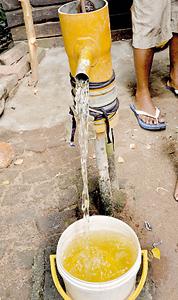News
Not just Rathupaswela, many more areas polluted by factory waste
Following allegations that waste material from a company was polluting the water in Rathupaswala, Weliwerivya, similar cases of environmental pollution have been reported from various parts of the country. The other areas include Ekala, Kadalawala-Wattala close to Bopitiya, Jaela, Katunayake, Biyagama, Muthurajawela and Galle, environmentalists say.

A resident in Ekala shows the yellow water that comes from his tube well
When the Sunday Times visited the Kadalawala area where charges have been levelled at a palm oil company for polluting the environment people complained of breathing difficulties because of the black fumes emanating from the factory. “My wife and son have severe phlegm. They have been to many doctors and they all say they are being affected by some pollutant in the air,” a resident who didn’t want to be named said.
He said vllagers had protested against the factory urging authorities to move the factory to another place. But the protests came to a halt when the villagers were threatened by unidentified groups. He said the soil too in Kadalawala area appeared to be contaminated as crop cultivation especially banana and coconut had been affected. “Even tube well water is contaminated. We cannot use the water even to wash clothes unlike three or four years ago.
One could get the heavy pungent smell of oil in the air. “Previously the factory used gas to boil the oil but recently they have been using firewood to bring down the cost. After they started using firewood air pollution has increased and the smell is very strong,” the villager said.
According to villagers India had rejected a proposal to set up this palm oil factory therefore it was built in Sri Lanka. Environmentalist Ravindra Kariyawasam too confirmed this. Meanwhile another resident complained that the factory recycled waste thrice a month causing severe air pollution. He said the activities were carried out late in the nights and early mornings.
In another instance a paint factory on St. Anthony’s Mawatha in Ekala has been found to be dumping effluents that are allegedly polluting the water in the area. Most of the residents in this area depend on well and tube well water. According to the residents living in the vicinity of the factory they had found yellow water in the wells and tube wells.
The residents said they had agitated against the company and had lodged many complaints with necessary authorities. Following this the paint company had provided area residents with drinking water in huge tubs. A year ago the residents had obtained a waterline from the Water Supply Board. But the people say they cannot pay for the water as they are low-income earners. Therefore they continue to use the ‘yellow water’ for their day-to-day activities like bathing and washing except for drinking. Sarathkumara a resident said some people had loss of teeth, skin allergies because of the yellow water. The water also has a bad smell he added.

The Palm oil Factory. Pix by Susantha Liyanawatte
In another case in Galle, water contamination has been reported due to chemical waste released from shoe factories. The well water had turned black affecting more than 30 people who are reportedly suffering from cancer, the Sunday Times learns. According to Environmentalist Ravindra Kariyawasam, National Coordinator, Centre for Environment and Nature Studies, sme 200 families living in Imaduwa and Dorape in Galle have been affected by this ‘black water’. A complaint has been lodged at the Central Environment Authority to test the water and soil in the area.
Mr. Kariyawasam said the factory owners have promised to solve the problem if the contamination was found to be due the effluents from the factory. Hemantha Withanage , Director Centre for Environmental Justice said although most of the factories in Ekala and Jaela hold an Environmental Protection License they dump asbestos and other kinds of waste in the marshy land in the area.
“Many of the residents in these areas are unaware that asbestos has been used to fill their lands but assume it is being filled with cement. They are unaware of the contamination. Ordinary people don’t know about PH levels in their drinking water,” he said.
Mr. Withanage stressed that the water and soil should be tested by Public Health Inspectors in affected areas to test the PH levels. But this is not carried out. Even the CEA has district level offices to examine environment issues yet this does not happen.
Mr. Withanage added that the Environmental Protection Licence is renewed every two to three years but it should be renewed every year and the CEA should inspect it. He charged that the law enforcement aspect of the CEA was not strong enough.
However Dr. R.M.S.K Rathnayake Director of Environment Pollution Control Division attached to the CEA, said that the National Environmental Act was being amended to bring in stronger regulatory powers. “Now an order has to be obtained by the court to take action against an alleged factory, but after the amendment the laws will be stronger and the CEA would be able to take action directly,” he said.
According to the National Environmental Act a six month imprisonment or a fine not less than Rs.10, 000 or both is imposed on those found guilty. CEA statistics reveal 72 complaints relating waste-disposal have been reported so far this year.
Follow @timesonlinelk
comments powered by Disqus

